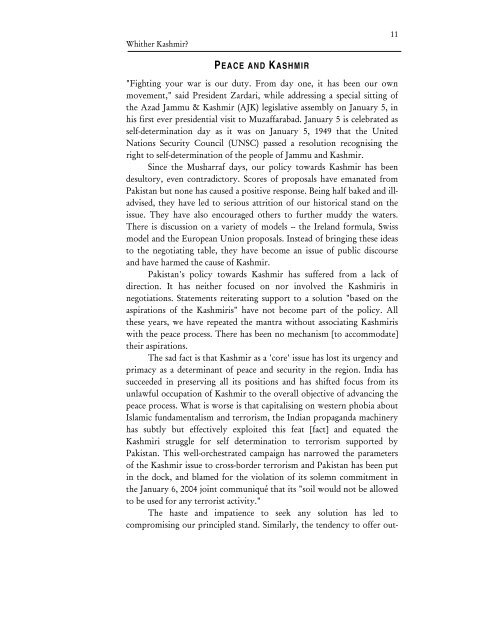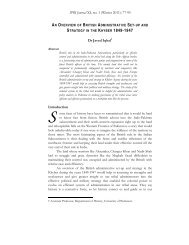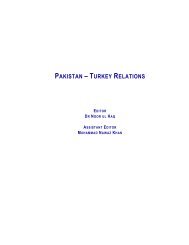120 Whither Kashmir? (Part II) - Islamabad Policy Research Institute
120 Whither Kashmir? (Part II) - Islamabad Policy Research Institute
120 Whither Kashmir? (Part II) - Islamabad Policy Research Institute
You also want an ePaper? Increase the reach of your titles
YUMPU automatically turns print PDFs into web optimized ePapers that Google loves.
<strong>Whither</strong> <strong>Kashmir</strong>?<br />
PEACE AND KASHMIR<br />
"Fighting your war is our duty. From day one, it has been our own<br />
movement," said President Zardari, while addressing a special sitting of<br />
the Azad Jammu & <strong>Kashmir</strong> (AJK) legislative assembly on January 5, in<br />
his first ever presidential visit to Muzaffarabad. January 5 is celebrated as<br />
self-determination day as it was on January 5, 1949 that the United<br />
Nations Security Council (UNSC) passed a resolution recognising the<br />
right to self-determination of the people of Jammu and <strong>Kashmir</strong>.<br />
Since the Musharraf days, our policy towards <strong>Kashmir</strong> has been<br />
desultory, even contradictory. Scores of proposals have emanated from<br />
Pakistan but none has caused a positive response. Being half baked and illadvised,<br />
they have led to serious attrition of our historical stand on the<br />
issue. They have also encouraged others to further muddy the waters.<br />
There is discussion on a variety of models -- the Ireland formula, Swiss<br />
model and the European Union proposals. Instead of bringing these ideas<br />
to the negotiating table, they have become an issue of public discourse<br />
and have harmed the cause of <strong>Kashmir</strong>.<br />
Pakistan's policy towards <strong>Kashmir</strong> has suffered from a lack of<br />
direction. It has neither focused on nor involved the <strong>Kashmir</strong>is in<br />
negotiations. Statements reiterating support to a solution "based on the<br />
aspirations of the <strong>Kashmir</strong>is" have not become part of the policy. All<br />
these years, we have repeated the mantra without associating <strong>Kashmir</strong>is<br />
with the peace process. There has been no mechanism [to accommodate]<br />
their aspirations.<br />
The sad fact is that <strong>Kashmir</strong> as a 'core' issue has lost its urgency and<br />
primacy as a determinant of peace and security in the region. India has<br />
succeeded in preserving all its positions and has shifted focus from its<br />
unlawful occupation of <strong>Kashmir</strong> to the overall objective of advancing the<br />
peace process. What is worse is that capitalising on western phobia about<br />
Islamic fundamentalism and terrorism, the Indian propaganda machinery<br />
has subtly but effectively exploited this feat [fact] and equated the<br />
<strong>Kashmir</strong>i struggle for self determination to terrorism supported by<br />
Pakistan. This well-orchestrated campaign has narrowed the parameters<br />
of the <strong>Kashmir</strong> issue to cross-border terrorism and Pakistan has been put<br />
in the dock, and blamed for the violation of its solemn commitment in<br />
the January 6, 2004 joint communiqué that its "soil would not be allowed<br />
to be used for any terrorist activity."<br />
The haste and impatience to seek any solution has led to<br />
compromising our principled stand. Similarly, the tendency to offer out-<br />
11




